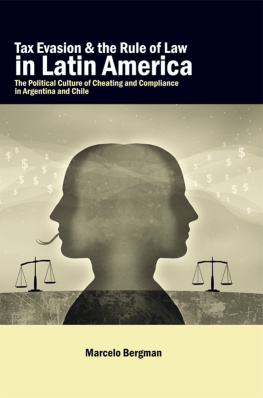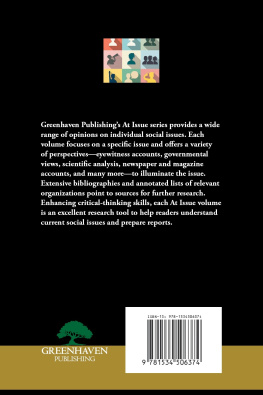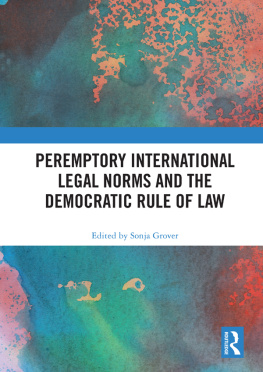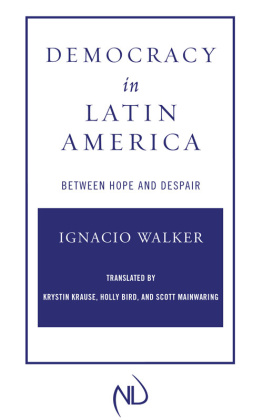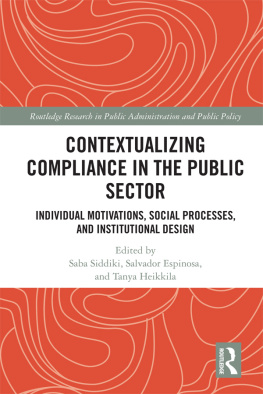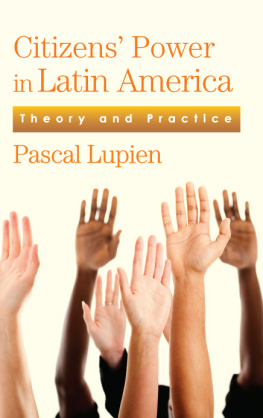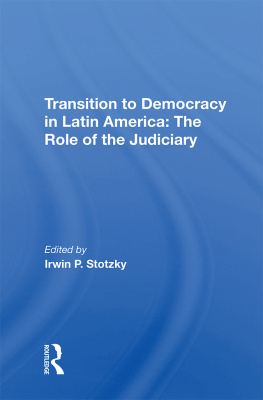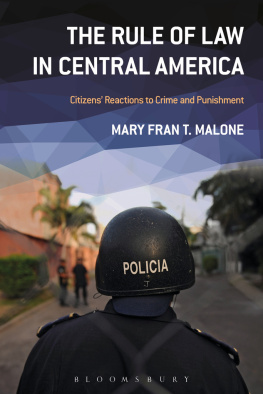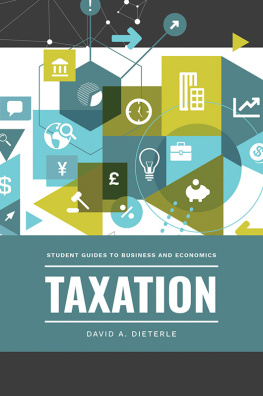Library of Congress
Cataloging-in-Publication Data
Bergman, Marcelo.
Tax evasion and the rule of law in Latin America : the political culture of cheating and compliance in Argentina and Chile / Marcelo Bergman.
p. cm.
Includes bibliographical references and index.
Summary: Compares the tax systems in Argentina and Chile. Examines differences in law abidance between the two countries and the effectiveness of legal enforcementProvided by publisher.
ISBN 978-0-271-03562-8 (cloth : alk. paper)
1. Tax evasionArgentina.
2. Tax evasionChile.
3. Taxpayer complianceArgentina.
4. Taxpayer complianceChile.
5. Tax administration and procedureArgentina.
6. Tax administration and procedureChile.
7. TaxationLaw and legislationArgentina.
8. TaxationLaw and legislationChile.
I. Title. KH917.B47 2009
345.8202338dc22 2009010761
Copyright 2009
The Pennsylvania State University
All rights reserved
Printed in the United States of America
Published by
The Pennsylvania State University Press,
University Park, PA 16802-1003
The Pennsylvania State University Press is a member of the Association of American University Presses.
It is the policy of The Pennsylvania State University Press to use acid-free paper. Publications on uncoated stock satisfy the minimum requirements of American National Standard for Information SciencesPermanence of Paper for Printed Library Material, ANSI Z 39.481992.
This book is printed on Natures Natural, which contains 50% post-consumer waste.
When Benjamin Disraeli, the distinguished British prime minister, pronounced his maxim that there are two inevitabilities in life, death and taxation, he surely did not have the Argentines in mind. Indeed, the inhabitants of the pampas have yet to find a way to avoid death, but they have certainly mastered the art of avoiding taxes. On the other side of the Andes Mountains, the human genome of the Chileans is no different from that of the Argentines. And although for some Chileans taxes are as evitable as for the Argentines, for most of them taxes are much more serious and unavoidable. Human behavior, and not genetics, explains tax evasion.
Tax compliance is one of the central political and social behaviors in modern states. The willingness of citizens to comply with tax laws reflects several features of social and political life: the ability of central governments to enforce laws, the level of a governments legitimacy, and the extent of social solidarity, among others. Yet compliance with tax laws depends on many personal and elusive decisions, which are embedded in a wide range of social processes. Culture, perceptions of law enforcement, and self-interest constrain an individuals decision to comply with tax laws. In Tax Evasion and the Rule of Law in Latin America, I argue that tax compliance should be understood as an outcome of individual decisions based on socially determined self-interests. This has crucial implications for public policies and governance.
By systematically studying taxation as law, this book contributes to the understanding of a much broader problem, the rule of law. I empirically show how enforcement operates under favorable or adverse conditions, and how culture preconditions and limits the success of state measures. In this study, I provide answers to two important concerns of social scientists studying the developing world: Why are rules consistently violated? And what are the conditions that make norms and policies viable?
I have studied and lived in four very different countries for extended periods, speaking several languages and engaging with different cultures. One of the most challenging questions that I pondered over the years is how social orders come to embrace norms, to cooperate and undertake difficult social endeavors for the welfare of the people. Conversely, I was puzzled that certain societies fail to develop the tools for distributive justice. This book is a response to years of observation and personal engagement. Combining strong empirical research and sound methods, I invite readers to rethink models of social cooperation and to envision intellectual reflection and novel practices that will enhance fairness and welfare.
I began this journey more than ten years ago with a desire to uncover the paradoxical, split paths of many developing and developed nations regarding their ability to foster cooperative behavior and adherence to norms. From the early stages of this research I had, and still have, a strong conviction that the riddle of compliance and legal behavior has to be tested empirically. I firmly believe that data must be produced if it is not available. A large part of this project has been the relentless pursuit of the best available data to study these problems.
I would like first to acknowledge my mentor, professor Carlos Waisman from UC San Diego, who guided me through the many phases of my dissertation. Carloss unflagging perfectionism, coupled with his trust in me and in this project, was essential to the definition of my dissertation and all my ensuing research. A special recognition goes to professor Joseph Gusfield, who introduced me to the novel world of sociology of law. My teachers and colleagues at the Hebrew University of Jerusalem, the University of California at San Diego, and the University of Oregon have contributed directly or indirectly to the refinement of my arguments.
The collection of data took five years and many twists. I am indebted to the hundreds of officers at the Chilean and Argentine tax agencies who helped me throughout the process. Special thanks go to current or past officers at both agencies, especially to Carlos Silvani, Horacio Castagnola, and Mario Rosell in Argentina, and to Michel Jorrat and Juan Toro in Chile. Many thanks to Estela Calello, Jaime Etcheberry, Juan Carlos Gomez Sabaini, Alejandro Otero, Antonio Ostornol, Javier Portal, Pablo Serra, and Jorge Trujillo.
Six surveys, laboratory experiments, and extensive tax return data processing required generous financial support. I am indebted first to the tax administrations that embraced part of the project as their own. At different phases, I participated in and directed some of these studies in exchange for the data. Other data collections were financed by generous support from the Ford Foundation, the United Nations Program for Development, and the William and Flora Hewlett Foundation.
Many people have helped me define, revise, sharpen, and fine-tune this book. I want to thank Kent Eaton and an anonymous reviewer at Penn State University Press for very detailed and insightful readings of my book. My appreciation goes to Sandy Thatcher for his very professional and diligent attention to this project, and for the care that he took to make this book the best it could be.
I would not have been able to find a more encouraging institution to house my work than the Centro de Investigacin y Docencia Econmica ( CIDE ) in Mexico City. I thank Carlos Elizondo and Blanca Heredia for their professional encouragement from the inception of this project and for sharing my passion for taxes and the rule of law. Enrique Cabrero and Ana Laura Magaloni fully endorsed my work and provided me with extraordinary encouragement. A long list of colleagues and friends have read or discussed chapters and ideas of this book. Sergio Berensztein, Fabrice Lehoucq, James Mahon, Jaime Malamud, Gabriel Negretto, Guillermo ODonnell, Carlos Rosencrantz, Silvio Waisbord, and Laurence Whitehead stimulated new questions and offered helpful comments. For hours and hours of stimulating debates on taxes, compliances, and the challenges of the rule of law in developing countries, I thank my colleagues at CIDE : Javier Aparicio, David Arellano, Victor Carreon, Gustavo Fondevila, Juan Pablo Guerrero, Fausto Hernandez, Benito Nacif, Rodolfo Sarsfield, Andreas Schedler, John Scott, and Juan Manuel Torres. A special acknowledgment goes to my assistant, Adriana Villalon, for her exceptional support, to Ruth Homrighaus for her professional editing work, to Ruth Halvey for her support with revisions, and to Armando Nevarez for helping me with the data.

